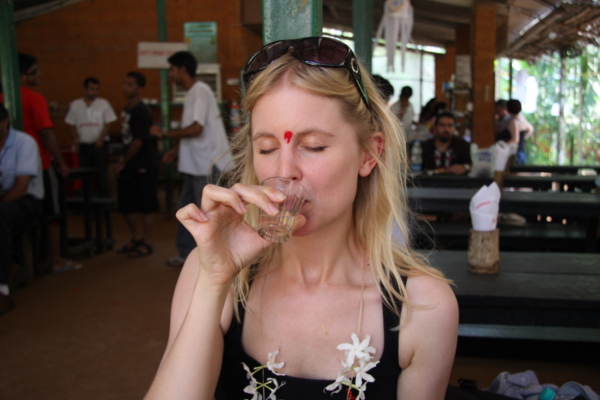If you ever travel to Goa and fancy a tipple, you can guarantee that there will be a bottle or two (or three) of feni behind the bar. Feni is produced exclusively in Goa; it’s considered to be a ‘country liquor’ and so cannot be sold outside of the state.
Feni is typically distilled in small batches, meaning that it retains many of the flavours and aromas of the juice used to produce it. And it certainly packs a punch: with typical alcoholic content ranging from 42-45%, you may want to stick to drinking just one or two (small) glasses of the fiery spirit at any one time.
The term ‘feni’ actually derives from the Sanskrit word ‘phena,’ which means ‘froth.’ It is believed that feni earned its name due to the froth that forms when the drink is poured or shaken. Drink it neat over ice, mix it with juice, or enjoy it in a cocktail – the choice is yours. And another choice you’ll be making is which flavour feni to sample first: coconut or cashew.

With native coconut trees dominating most of Goa’s coastline, it is believed that coconut feni came first, followed later by the cashew variety. Coconut feni is made using fermented coconut palm toddy as the base. Because coconut trees can be ‘tapped’ whenever, coconut feni is made throughout the year.However, the monsoon months are particularly good for distillers, as more toddy is produced by the coconut palms.
Cashew feni, on the other hand, is seasonal, and is distilled between the months of February and May. Traditionally, cashew feni is made using only fallen, tree-ripened cashew apples. The apples are de-seeded and then emptied into a ‘stomping area,’ where people will quite literally stomp on the fruit to release its juice. This method is now being replaced by the use of a fruit press, known in India as a pingre. The juice is left to ferment for a few days before it is distilled to produce feni.
Cashew feni is a triple-distilled spirit, whereas coconut feni is a double distilled spirit. Both spirits are distilled in a large copper pot called a bhann. With a wooden stopper sealing the mouth of the bhann, vapours travel through a tube and are collected in a clay pot, called a launni.
For a long time in Goa, locals would buy their feni directly from the many hundreds of traditional distillers living in the small villages. However, in the past few years, locals have started turning to standardised bottled feni. Large quantities of feni produced by distillers are sold straight to taverns, while there are many branded bottles to cater for tourists visiting the state.
If you take a trip to Goa, then you simply must sample a glass or two of the region’s spirit. Cheers to that!
In the meantime, why not treat yourself to one or two scrumptious cocktails at Amaya, one of London’s best Indian fine dining restaurants? Using fresh, seasonal ingredients, mixologists create cocktails that make the perfect aperitif for your Indian meal. Perhaps you want to treat yourself to a Chilli Martini? Or how about a Hibiscus and Elderflower Bellini?





